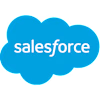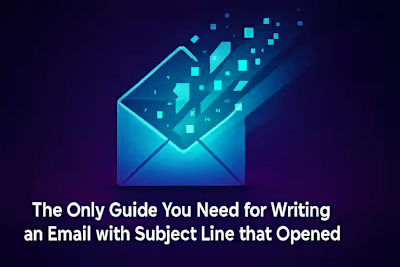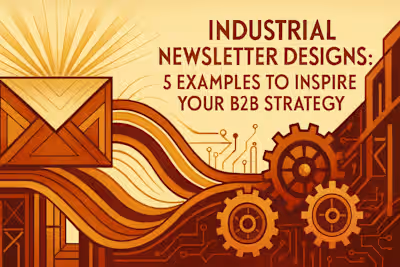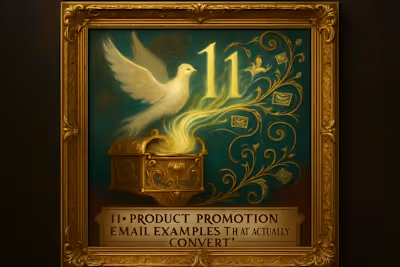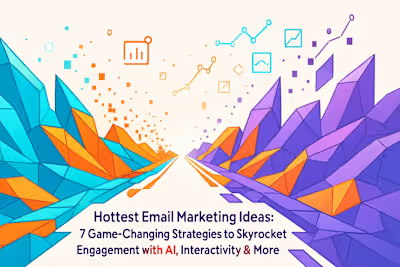Your Ultimate Guide to a Successful Email Marketing Career in 2025
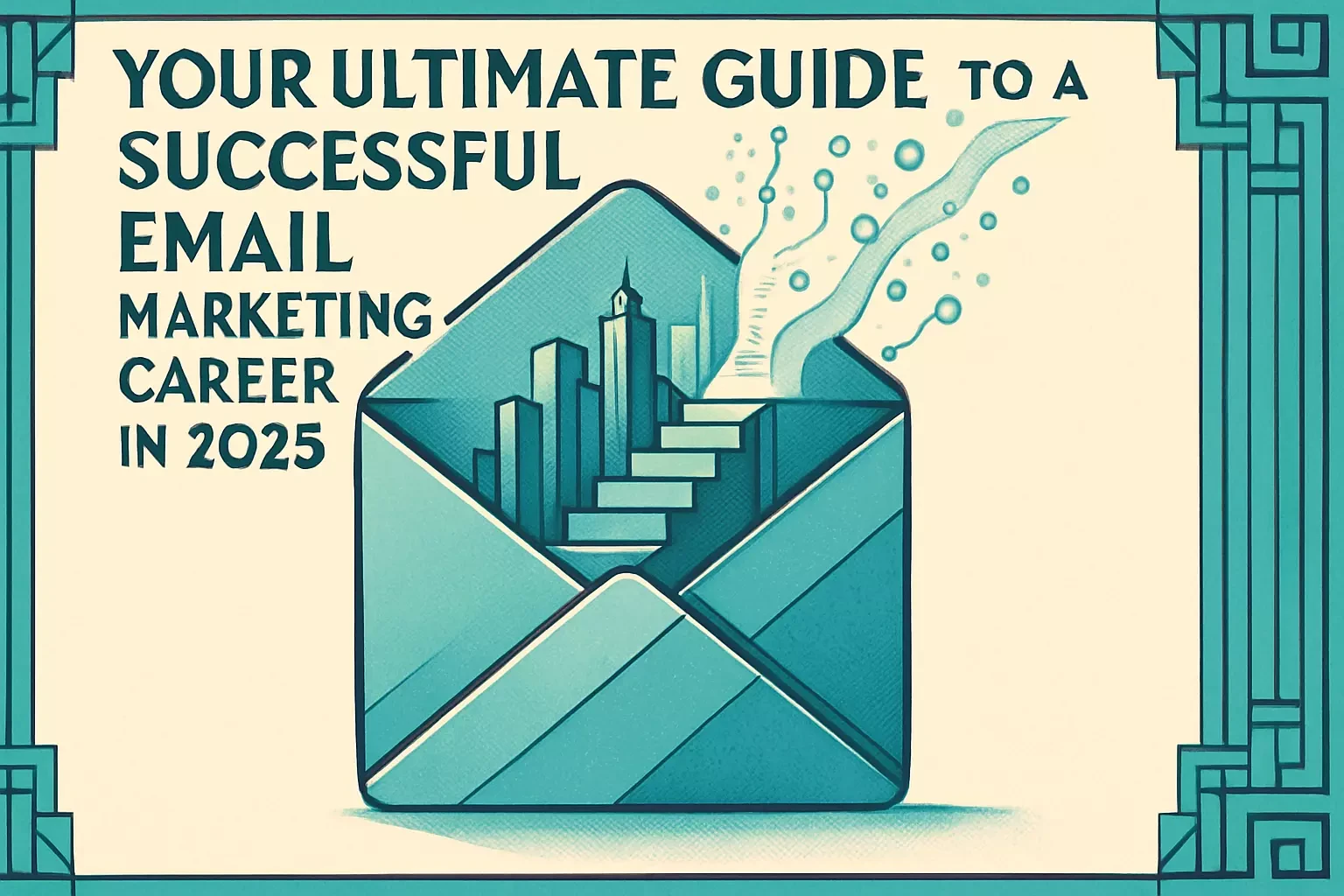
Your Ultimate Guide to a Successful Email Marketing Career in 2025
What Does an Email Marketer Actually Do?
Core Responsibilities
A Blend of Creativity and Analytics
Essential Skills for an Email Marketing Specialist
Technical and Analytical Skills
Creative and Strategic Skills
The Typical Email Marketing Career Path
Entry-Level Roles
Mid- to Senior-Level Roles
Specialized Career Tracks
How to Start Your Career in Email Marketing
Education and Certifications
Gaining Practical Experience
Building Your Portfolio
Conclusion
References
Your Ultimate Guide to a Successful Email Marketing Career in 2025
Email marketing isn't going anywhere. With over 4 billion people checking their inboxes daily and businesses sending millions of messages every hour, this field offers incredible opportunities for those ready to dive in. Whether you're just starting out or looking to level up your career, this guide will walk you through everything you need to know about building a successful path in email marketing.
The beauty of email marketing lies in its perfect blend of creativity and data. You get to craft messages that connect with people while using real numbers to prove your impact. For those looking to master the art of compelling subject lines, our guide on writing effective email subjects can provide a great starting point. And if you want to stay ahead of the curve, understanding the latest email marketing ideas is crucial for standing out in this competitive field.
What Does an Email Marketer Actually Do?
Let's get real about what your day might look like as an email marketer. It's way more than just hitting "send" on a newsletter. You'll find yourself wearing many hats throughout the week, from creative writer to data detective.
Your mornings might start with checking campaign performance from yesterday's send. Did that subject line test work? How many people clicked through to the landing page? Then you might switch gears to write copy for next week's product launch email. By afternoon, you could be deep in spreadsheets, segmenting your audience for a targeted campaign.
The role touches every part of the marketing ecosystem. You'll collaborate with designers to create eye-catching templates. You'll work with the content team to repurpose blog posts into digestible email content. And you'll coordinate with sales to ensure your nurture campaigns align with their outreach efforts.
Core Responsibilities
At its core, email marketing revolves around several key tasks that keep campaigns running smoothly. Campaign strategy sits at the heart of everything. You'll plan email calendars months in advance, deciding when to send what message to which audience segment.
A/B testing becomes your best friend. Should the button be blue or green? Does "Shop Now" convert better than "Explore Collection"? You'll constantly test different elements to squeeze out better performance. Small improvements add up – a 2% increase in click rates can mean thousands more customers.
Segmentation is where the magic happens. Instead of blasting the same message to everyone, you'll create targeted campaigns. New subscribers get a welcome series. Loyal customers receive VIP perks. Cart abandoners see reminders about their forgotten items. Each segment needs its own strategy and messaging.
Reporting ties everything together. You'll track open rates, click rates, conversions, and revenue. But it goes deeper than vanity metrics. You'll analyze subscriber behavior patterns, identify trends, and use insights to improve future campaigns. Your boss wants to know ROI, and you'll be the one to prove email's value.
A Blend of Creativity and Analytics
Email marketing sits at a unique crossroads. One moment you're crafting witty subject lines that make people smile. The next, you're knee-deep in conversion data trying to understand why Tuesday sends outperform Thursdays.
The creative side keeps things exciting. You'll write copy that tells stories and connects emotionally with readers. Design skills help too – understanding what makes an email visually appealing can set you apart. You don't need to be a graphic designer, but knowing basic design principles helps when working with creative teams.
But creativity without data is just guessing. The analytical side grounds your work in reality. You'll use tools to track every interaction, from opens to purchases. Heat maps show where people click. Engagement metrics reveal what content resonates. This data drives your creative decisions, creating a feedback loop that constantly improves results.
The best email marketers embrace both sides. They write compelling copy backed by data. They design beautiful emails that also convert. They balance art with science, creating campaigns that look good and perform even better.
Essential Skills for an Email Marketing Specialist
Success in email marketing requires a diverse skill set. Think of yourself as a Swiss Army knife – versatile and ready for any challenge. Some skills you'll use daily, while others come in handy for specific projects.
The good news? You don't need to master everything at once. Start with the basics and build from there. Many successful email marketers began with strong writing skills and learned the technical side on the job. Others started as data analysts and developed their creative abilities over time.
What matters most is curiosity and willingness to learn. Email marketing evolves constantly. New tools emerge. Best practices shift. Consumer behaviors change. Staying relevant means staying hungry for knowledge.
Technical and Analytical Skills
Let's talk tech. Email Service Providers (ESPs) form the backbone of your work. Platforms like Mailchimp, Klaviyo, or Salesforce Marketing Cloud become your daily workspace. Each has quirks and features to master. The more platforms you know, the more valuable you become.
HTML and CSS knowledge gives you superpowers. While many ESPs offer drag-and-drop builders, understanding code helps you customize templates and fix rendering issues. You don't need to be a developer, but basic coding skills set you apart from the crowd.
Data analysis turns numbers into stories. You'll live in spreadsheets and analytics dashboards. Understanding metrics like open rates, click-through rates, and conversion rates is just the start. You'll dig deeper into cohort analysis, lifetime value, and attribution modeling. Tools like Google Analytics and Excel become your best friends.
Deliverability might sound boring, but it's crucial. Your amazing email means nothing if it lands in spam. You'll learn about sender reputation, authentication protocols, and inbox placement. Understanding technical concepts like SPF, DKIM, and DMARC helps ensure your emails reach their destination.
Marketing automation takes your skills to the next level. You'll build complex workflows that nurture leads automatically. Welcome series, abandoned cart reminders, and re-engagement campaigns run while you sleep. Mastering automation tools multiplies your impact exponentially.
Creative and Strategic Skills
Words matter in email marketing. Strong copywriting can make or break a campaign. You'll write subject lines that demand attention. Body copy that tells stories. CTAs that inspire action. Each word counts when you have seconds to capture interest.
Content creation goes beyond writing. You'll repurpose blog posts, create exclusive email content, and develop editorial calendars. Understanding different content formats helps you match the message to the medium. Some stories work better as text, others as images or videos.
Design principles guide your visual decisions. You don't need to be an artist, but understanding hierarchy, white space, and mobile responsiveness helps. Knowing why certain layouts work better than others improves your collaboration with designers.
Strategic thinking separates good email marketers from great ones. You'll see beyond individual campaigns to the bigger picture. How does email fit into the overall marketing strategy? What role does it play in the customer journey? Strategic thinkers connect email efforts to business goals.
Project management keeps everything running smoothly. You'll juggle multiple campaigns, coordinate with various teams, and meet tight deadlines. Organization skills prevent important tasks from falling through cracks. Tools like Asana or Trello help manage the chaos.
The Typical Email Marketing Career Path
Email marketing offers clear progression from entry-level to executive positions. Your journey might start with executing campaigns and evolve into shaping company-wide strategies. The path isn't always linear – some people specialize deeply while others broaden into general marketing leadership.
Salary growth reflects increasing responsibility. Entry-level positions might start around $40,000-$50,000, while experienced managers earn $70,000-$100,000. Senior strategists and directors can command six figures, especially in tech companies or agencies.
The best part? Email marketing skills transfer across industries. Every business needs email expertise, from startups to Fortune 500 companies. This flexibility lets you explore different sectors while building on your core skills.
Entry-Level Roles
Your journey often begins as an Email Marketing Coordinator or Assistant. These roles focus on execution rather than strategy. You'll schedule campaigns, update email templates, and manage subscriber lists. It's hands-on learning at its finest.
Daily tasks include setting up campaigns in the ESP, proofreading copy, and basic reporting. You might help with A/B tests or assist in segmentation projects. While you won't lead strategy yet, you'll see how all the pieces fit together.
Internships offer another entry point. Many companies need help with email marketing but can't justify a full-time hire. Internships let you gain experience while companies evaluate your potential. Some of the best email marketers started as interns who proved their worth.
The learning curve feels steep initially. New terminology, unfamiliar tools, and industry best practices can overwhelm. But within months, tasks that seemed impossible become routine. Each campaign builds confidence and expertise.
Mid- to Senior-Level Roles
After mastering the basics, you'll move into Email Marketing Manager or Specialist roles. Now you own campaigns from conception to analysis. You'll develop strategies, not just execute them. Your opinion matters in planning meetings.
Responsibilities expand significantly. You'll manage budgets, lead A/B testing programs, and present results to leadership. You might supervise coordinators or work with agencies. The role becomes more strategic and less tactical.
Senior positions like Email Marketing Strategist or Head of Lifecycle Marketing shape company-wide initiatives. You'll design multi-channel campaigns that integrate email with other marketing efforts. Your focus shifts from individual campaigns to customer lifetime value and retention strategies.
Leadership roles bring new challenges. You'll hire and train team members. You'll defend budgets and prove ROI to skeptical executives. You'll stay current with industry trends while managing day-to-day operations. It's demanding but rewarding work.
Specialized Career Tracks
Email marketing offers numerous specialization paths. B2B email marketers focus on longer sales cycles and account-based strategies. They nurture leads through complex buying processes, often working closely with sales teams.
B2C specialists master different skills. They create campaigns that drive immediate purchases, manage flash sales, and build brand loyalty. The pace is faster, with more frequent sends and seasonal campaigns.
Email developers carve out technical niches. They code custom templates, ensure cross-client compatibility, and solve rendering issues. This path suits those who enjoy problem-solving and technical challenges.
Design-focused roles appeal to visual thinkers. Email designers create stunning templates that work across devices. They balance aesthetics with functionality, ensuring emails look great and drive action.
Marketing operations professionals focus on systems and processes. They manage tech stacks, implement automation, and ensure data flows correctly between platforms. This path combines technical skills with strategic thinking.
How to Start Your Career in Email Marketing
Breaking into email marketing doesn't require a specific degree or years of experience. Many successful professionals stumbled into the field from diverse backgrounds. What matters is demonstrating relevant skills and genuine interest.
The key is starting somewhere. Your first role might not be perfect, but it provides invaluable experience. Each project teaches new lessons. Each campaign builds your portfolio. Before long, you'll have the expertise employers seek.
Remember, everyone started as a beginner. That senior strategist you admire once sent their first campaign with shaking hands. The path forward requires patience, persistence, and continuous learning.
Education and Certifications
While a marketing degree helps, it's not mandatory. Many email marketers studied English, Psychology, or completely unrelated fields. What matters more is understanding marketing principles and showing you can apply them.
Online courses offer flexible learning options. Platforms like Coursera, Udemy, and LinkedIn Learning provide comprehensive email marketing training. Start with beginner courses covering basics like list building and campaign creation. Progress to advanced topics like automation and personalization.
Industry certifications add credibility to your resume. HubSpot's Email Marketing Certification is free and well-respected. Salesforce offers various Marketing Cloud certifications for those using their platform. Google Analytics certification helps with the data side.
Don't overlook free resources. Industry blogs, podcasts, and YouTube channels provide ongoing education. Follow thought leaders on social media. Join email marketing communities on Reddit or Facebook. Surrounding yourself with industry content accelerates learning.
Gaining Practical Experience
Theory only goes so far. Hands-on experience separates serious candidates from casual learners. Fortunately, opportunities to practice email marketing exist everywhere.
Start with personal projects. Launch a newsletter about your hobby. Help a local nonprofit with their email campaigns. Manage communications for a student organization. These experiences provide real examples for your portfolio.
Freelance work offers another path. Small businesses often need email help but can't afford agencies. Offer competitive rates while you build experience. Each client teaches new lessons about different industries and audiences.
Volunteer opportunities abound. Charities, political campaigns, and community organizations need email marketing support. While unpaid, these roles provide valuable experience and networking opportunities. Plus, you're contributing to causes you care about.
Internships fast-track learning. Even unpaid internships at reputable companies provide invaluable experience. You'll see how professional teams operate. You'll use enterprise-level tools. Most importantly, you'll build connections that can lead to full-time opportunities.
Building Your Portfolio
Your portfolio proves you can deliver results. Employers want to see real campaigns, not just hear about your skills. A strong portfolio opens doors that credentials alone cannot.
Include diverse examples showcasing different skills. Show a welcome series demonstrating automation abilities. Include a promotional campaign highlighting your copywriting. Add a re-engagement campaign proving you understand segmentation and strategy.
Results matter more than pretty designs. Include metrics showing campaign performance. Did your subject line test increase open rates? Did your segmentation strategy improve conversions? Numbers tell powerful stories about your impact.
Present work professionally. Create case studies explaining your strategy, execution, and results. Use tools like Behance or create a simple website to showcase projects. Make it easy for employers to understand your contributions and achievements.
Don't have client work to show? Create spec campaigns for brands you admire. Redesign existing emails to demonstrate improvement ideas. Show your thinking process, not just final products. Employers value strategic thinking as much as execution skills.
Conclusion
Email marketing offers an exciting career path for those willing to embrace both creativity and analytics. The field continues growing as businesses recognize email's incredible ROI and direct connection to customers. Your journey might start with simple newsletter sends, but it can lead to shaping marketing strategies for major brands.
Success in email marketing comes from continuous learning and adaptation. Technology evolves. Consumer preferences shift. New platforms emerge. Staying relevant means staying curious and flexible. The skills you develop – from data analysis to creative problem-solving – transfer across marketing disciplines and industries.
Take the first step today. Sign up for a course. Start a newsletter. Volunteer for a campaign. Every expert was once a beginner who decided to start. Your unique perspective and fresh ideas are exactly what the industry needs. The inbox is waiting for your creativity.
References
Like this project
Posted Jun 20, 2025
Ready to launch your email marketing career? Explore career paths, essential skills, salary expectations, and expert tips to land your dream job in this dynamic field.



